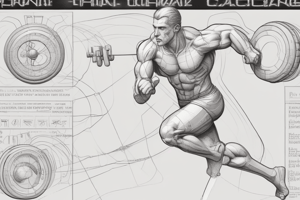Podcast
Questions and Answers
What is the cornerstone of the coaching philosophy discussed in this book?
What is the cornerstone of the coaching philosophy discussed in this book?
- Maximizing athletes' chances of success
- Developing mental skills
- Creating a coaching philosophy (correct)
- Mastering physical skills
What is the first step toward mastering the mental game?
What is the first step toward mastering the mental game?
- Personal responsibility
- Mental skills training
- Systematic practice
- Self-awareness (correct)
What is a key aspect of mental skills training?
What is a key aspect of mental skills training?
- Responding to difficult events
- Buying into the coaching philosophy
- Taking personal responsibility
- Systematic practice (correct)
What is the primary focus of sport, according to the text?
What is the primary focus of sport, according to the text?
What is the ultimate goal of mental skills training?
What is the ultimate goal of mental skills training?
What is implied about the mental skills needed for success?
What is implied about the mental skills needed for success?
What is the primary purpose of dividing the graph into pie-shaped wedges in the performance profile?
What is the primary purpose of dividing the graph into pie-shaped wedges in the performance profile?
What does each circle in the performance profile graph represent?
What does each circle in the performance profile graph represent?
Which of the following is NOT a subscale of the TOPS?
Which of the following is NOT a subscale of the TOPS?
What is the purpose of having athletes keep a mental training log?
What is the purpose of having athletes keep a mental training log?
What is the primary purpose of the Practice Flow Mind-Set Assessment Form (PFMAF)?
What is the primary purpose of the Practice Flow Mind-Set Assessment Form (PFMAF)?
What should athletes do within 20 minutes of the start of practice?
What should athletes do within 20 minutes of the start of practice?
What is the purpose of identifying the mental skills most closely related to an athlete's performance extremes?
What is the purpose of identifying the mental skills most closely related to an athlete's performance extremes?
What is the difference between the practice log-keeping process and the competitive log-keeping process?
What is the difference between the practice log-keeping process and the competitive log-keeping process?
What is the purpose of using the ACSI-28?
What is the purpose of using the ACSI-28?
What is the benefit of graphing the data collected from the PFMAF?
What is the benefit of graphing the data collected from the PFMAF?
What is essential to do before evaluating the effectiveness of an MST program?
What is essential to do before evaluating the effectiveness of an MST program?
Which of the following is NOT a component of effective MST programs?
Which of the following is NOT a component of effective MST programs?
What is the primary goal of the educational phase in MST programs?
What is the primary goal of the educational phase in MST programs?
What is the main purpose of performance profiling in MST programs?
What is the main purpose of performance profiling in MST programs?
What determines the type of mental skills training program developed?
What determines the type of mental skills training program developed?
What is the primary benefit of using performance profiling in MST programs?
What is the primary benefit of using performance profiling in MST programs?
What is the purpose of the acquisition phase in MST programs?
What is the purpose of the acquisition phase in MST programs?
What is the primary focus of the implementation phase in MST programs?
What is the primary focus of the implementation phase in MST programs?
What is the main difference between performance profiling and mental skill assessment?
What is the main difference between performance profiling and mental skill assessment?
Why is it important to rate mental and physical skills on two dimensions in performance profiling?
Why is it important to rate mental and physical skills on two dimensions in performance profiling?
What is the primary purpose of having athletes complete the Competitive Flow Mind-Set Assessment Form (CFMAF)?
What is the primary purpose of having athletes complete the Competitive Flow Mind-Set Assessment Form (CFMAF)?
When should the CFMAF be completed?
When should the CFMAF be completed?
What type of logs do athletes tend to use more regularly?
What type of logs do athletes tend to use more regularly?
Why is it essential to personalize log forms for athletes?
Why is it essential to personalize log forms for athletes?
What is the purpose of including self-talk sheets in logs?
What is the purpose of including self-talk sheets in logs?
What is the importance of observation and individual meetings in coaching?
What is the importance of observation and individual meetings in coaching?
Why is it essential to establish a good relationship with athletes during individual meetings?
Why is it essential to establish a good relationship with athletes during individual meetings?
What is the primary purpose of emphasizing self-monitoring strategies in MST programs?
What is the primary purpose of emphasizing self-monitoring strategies in MST programs?
Why is honest and accurate data critical in evaluation?
Why is honest and accurate data critical in evaluation?
What is the purpose of color coding different forms in logs?
What is the purpose of color coding different forms in logs?
What is the purpose of incorporating team automation drills into MST programs?
What is the purpose of incorporating team automation drills into MST programs?
What should athletes focus on during at least half of their individual MST practice time?
What should athletes focus on during at least half of their individual MST practice time?
What is the benefit of conducting MST practice sessions on the field, court, or track?
What is the benefit of conducting MST practice sessions on the field, court, or track?
What is the purpose of teaching players to relax their hands on contact during a rebounding drill?
What is the purpose of teaching players to relax their hands on contact during a rebounding drill?
What is the primary focus of well-designed MST programs?
What is the primary focus of well-designed MST programs?
What is the benefit of incorporating simulation training into MST programs?
What is the benefit of incorporating simulation training into MST programs?
What is the primary purpose of using assessment in mental training programs?
What is the primary purpose of using assessment in mental training programs?
Why is it essential to monitor progress in mental training programs?
Why is it essential to monitor progress in mental training programs?
What is the consequence of not monitoring progress in mental training programs?
What is the consequence of not monitoring progress in mental training programs?
Why do athletes tend to distort their responses during assessment?
Why do athletes tend to distort their responses during assessment?
What is the purpose of educating athletes about MST programs?
What is the purpose of educating athletes about MST programs?
What happens to athletes' subjective rating criteria as they develop more self-awareness and skill?
What happens to athletes' subjective rating criteria as they develop more self-awareness and skill?
What is the primary focus of basic MST programs?
What is the primary focus of basic MST programs?
What is the result of using assessment for the right reasons?
What is the result of using assessment for the right reasons?
Why is it essential to convince athletes that assessment is for their personal development?
Why is it essential to convince athletes that assessment is for their personal development?
What is the outcome of not using assessment for the right reasons?
What is the outcome of not using assessment for the right reasons?
What is the primary objective of having athletes complete individual and team performance profiles during the second full session?
What is the primary objective of having athletes complete individual and team performance profiles during the second full session?
What is the recommended approach to introducing mental training tools, skills, and plans in basic MST programs?
What is the recommended approach to introducing mental training tools, skills, and plans in basic MST programs?
What is the primary benefit of athletes developing a mental plan?
What is the primary benefit of athletes developing a mental plan?
Why is it recommended to sequence tools in the program according to athletes' perception of their importance?
Why is it recommended to sequence tools in the program according to athletes' perception of their importance?
What is the primary purpose of logging data on the five key mental skills?
What is the primary purpose of logging data on the five key mental skills?
What is the primary objective of the implementation phase in mental skills training?
What is the primary objective of the implementation phase in mental skills training?
What is the main goal of the education phase in mental skills training?
What is the main goal of the education phase in mental skills training?
Why is goal setting a great starting point for mental training?
Why is goal setting a great starting point for mental training?
What is the recommended approach to launch an MST program?
What is the recommended approach to launch an MST program?
What is the recommended approach to developing mental skills in basic MST programs?
What is the recommended approach to developing mental skills in basic MST programs?
What is the purpose of giving athletes a questionnaire during the MST program orientation?
What is the purpose of giving athletes a questionnaire during the MST program orientation?
What is the primary benefit of observing athletes carefully and scheduling time to talk to them about mental training issues?
What is the primary benefit of observing athletes carefully and scheduling time to talk to them about mental training issues?
Why is it recommended to limit the initial efforts to one mental plan that will provide the greatest performance benefits?
Why is it recommended to limit the initial efforts to one mental plan that will provide the greatest performance benefits?
How often should team sessions be conducted in a basic MST program?
How often should team sessions be conducted in a basic MST program?
What is the primary purpose of assigning homework between MST sessions?
What is the primary purpose of assigning homework between MST sessions?
What is the primary purpose of developing mental training tools in basic MST programs?
What is the primary purpose of developing mental training tools in basic MST programs?
What is the recommended duration for individual MST sessions?
What is the recommended duration for individual MST sessions?
What is the purpose of having athletes develop a performance profile?
What is the purpose of having athletes develop a performance profile?
What is the primary focus of the initial needs assessment in MST programs?
What is the primary focus of the initial needs assessment in MST programs?
What is the recommended approach to engage athletes in the learning process during MST programs?
What is the recommended approach to engage athletes in the learning process during MST programs?
What is the primary focus of the initial team acquisition session?
What is the primary focus of the initial team acquisition session?
What is the recommended approach for developing exercises or drills to acquire each mental training tool?
What is the recommended approach for developing exercises or drills to acquire each mental training tool?
What is the primary purpose of individual acquisition sessions in a basic MST program?
What is the primary purpose of individual acquisition sessions in a basic MST program?
What is the key to automating mental training tools, skills, and plans?
What is the key to automating mental training tools, skills, and plans?
Why is it important to automate mental training tools, skills, and plans?
Why is it important to automate mental training tools, skills, and plans?
What is the primary focus of the implementation phase of a basic MST program?
What is the primary focus of the implementation phase of a basic MST program?
What is the benefit of using a hands-on approach in team sessions?
What is the benefit of using a hands-on approach in team sessions?
What is the primary goal of the education phase of team sessions?
What is the primary goal of the education phase of team sessions?
What is the recommended approach for developing mental training exercises or drills?
What is the recommended approach for developing mental training exercises or drills?
What is the primary purpose of having occasional individual meetings with athletes?
What is the primary purpose of having occasional individual meetings with athletes?
Flashcards are hidden until you start studying
Study Notes
Coaching Philosophy
- A coaching philosophy is essential for a successful mental skills training (MST) program
- Key concepts include:
- Sport is a test of both physical and mental skills
- Mental skills can be learned through systematic practice
- Self-awareness is the first step to mastering the mental game
- Coaches must help athletes take personal responsibility for their actions
Components of Effective MST Programs
- Four components underlie effective self-change programs such as MST:
- Implementation must use a systematic process
- A needs assessment should be used to identify strengths and weaknesses
- Strategies must be personalized to meet individual needs and situational demands
- Regular self-monitoring should be used to assess progress and identify areas to modify
Systematic Implementation Process
- MST programs involve three phases:
- Education: providing athletes with a general education about mental training tools, skills, and plans
- Acquisition: helping athletes acquire the mental training tools, skills, and plans needed to make MST programs work
- Implementation: teaching athletes to automate components, build them into their game, and execute them under pressure
Develop Self-Awareness: Initial Needs Assessment
- Athletes need to understand their mental strengths and weaknesses and the situations that enable and undercut their mental toughness
- Techniques to help athletes develop self-awareness:
- Performance profiling: identify physical and mental characteristics essential to success
- Mental skills assessment: use inventories like the Test of Performance Strategies (TOPS) or the Athletic Coping Skills Inventory–28 (ACSI-28) to assess proficiency in mental training tools and skills
Personalize MST Programs
- MST programs are most effective when personalized to meet athletes’ needs and competitive constraints
- Strategies for personalization:
- Mental training logs: help athletes develop self-awareness and personalize their MST program
- Observation and interview strategies: help coaches gather information to understand athletes and team
Monitor Progress
- Objectively monitor athletes’ progress to assess whether programs are meeting objectives or need to be modified
- Use logs to monitor development of mental training tools, skills, and plans
- Use assessment to evaluate long-term development
Implementing a Basic MST Program
-
Basic MST programs are designed for coaches who want to introduce mental training to their athletes
-
Programs are designed to help athletes learn the mental side of sport and develop key mental training tools, skills, and plans### Ongoing Education About Mental Training
-
MST programs should include weekly or semiweekly team sessions to discuss mental training topics, such as goal setting, and assign homework to enhance understanding and promote basic skill development.
-
Individual sessions should be minimal, involving 10-20 minutes every other week, if deemed necessary.
Personal Education: Initial Needs Assessment
- Use instruments like TOPS or ACSI-28 to evaluate athletes' mental training needs.
- Develop a performance profile with athletes, listing 10-20 mental and physical characteristics as homework.
- Complete individual and team performance profiles during the second full session.
- Log data on key mental skills (self-confidence, positive mental attitude, focus and concentration, commitment to push their limits, and arousal level) for several weeks to identify areas that affect performance.
Acquisition Phase
- The acquisition phase helps athletes develop mental training tools, skills, and plans.
- Increase athletes' knowledge of sport psychology to change their perceptions of competition, performance, and skills.
- Develop the four basic mental training tools (goal setting, self-talk, imagery, relaxation, and energization).
- Ensure athletes put sufficient time into developing tools and focus on developing competence in key mental skills.
Mental Training Tools and Skills
- Develop a systematic routine to enhance performance using mental plans.
- Focus on one or two mental skills that need to be targeted for individual or team development, such as self-confidence and concentration.
- Introduce tools and skills in a staggered approach, with two weeks dedicated to each attribute.
Team Acquisition Sessions
- Hold team sessions once or twice a week, focusing on education and acquisition.
- Develop individual and team goals for the season, and action plans for accomplishing those goals.
- Teach athletes about mental training tools, and provide exercises or drills to acquire and automate these tools.
- Sequence exercises to start simple and gradually become more complex.
Individual Acquisition Sessions
- Minimize individual sessions due to time constraints, but use them to discuss athletes' needs, personalize their MST program, and deal with problems.
- Identify mental strengths and weaknesses, set goals, practice skills, and troubleshoot problems.
Implementation Phase
- Automate mental training tools, skills, and plans through extensive overlearning.
- Use practice strategies that emphasize overlearning, such as team MST practice, individual MST practice, and simulation training.
- Make team automation drills consistent with physical practice, simulating competitive demands.
- Help athletes develop an individual MST practice schedule that focuses on automating mental training tools, skills, and plans.
Studying That Suits You
Use AI to generate personalized quizzes and flashcards to suit your learning preferences.




